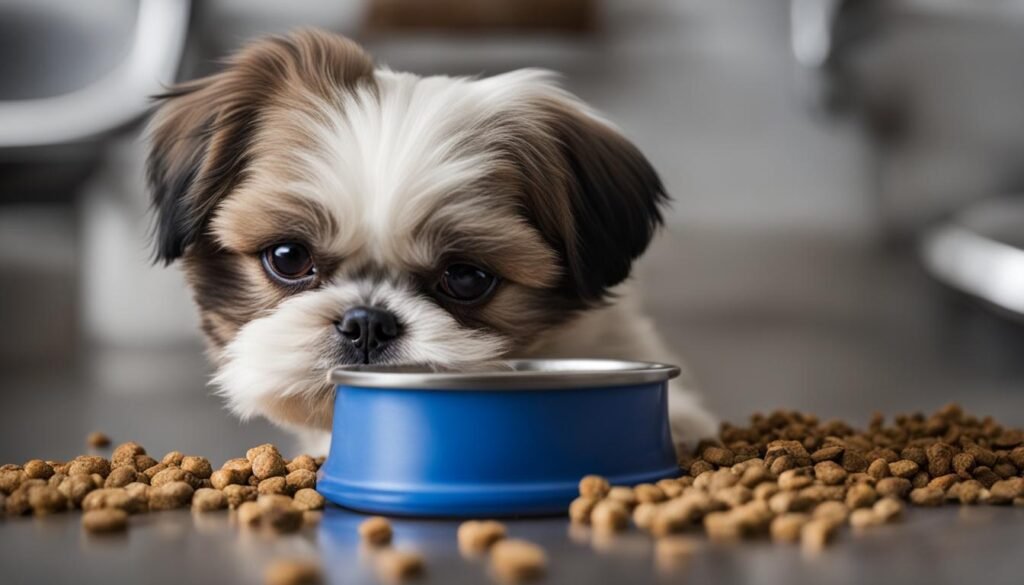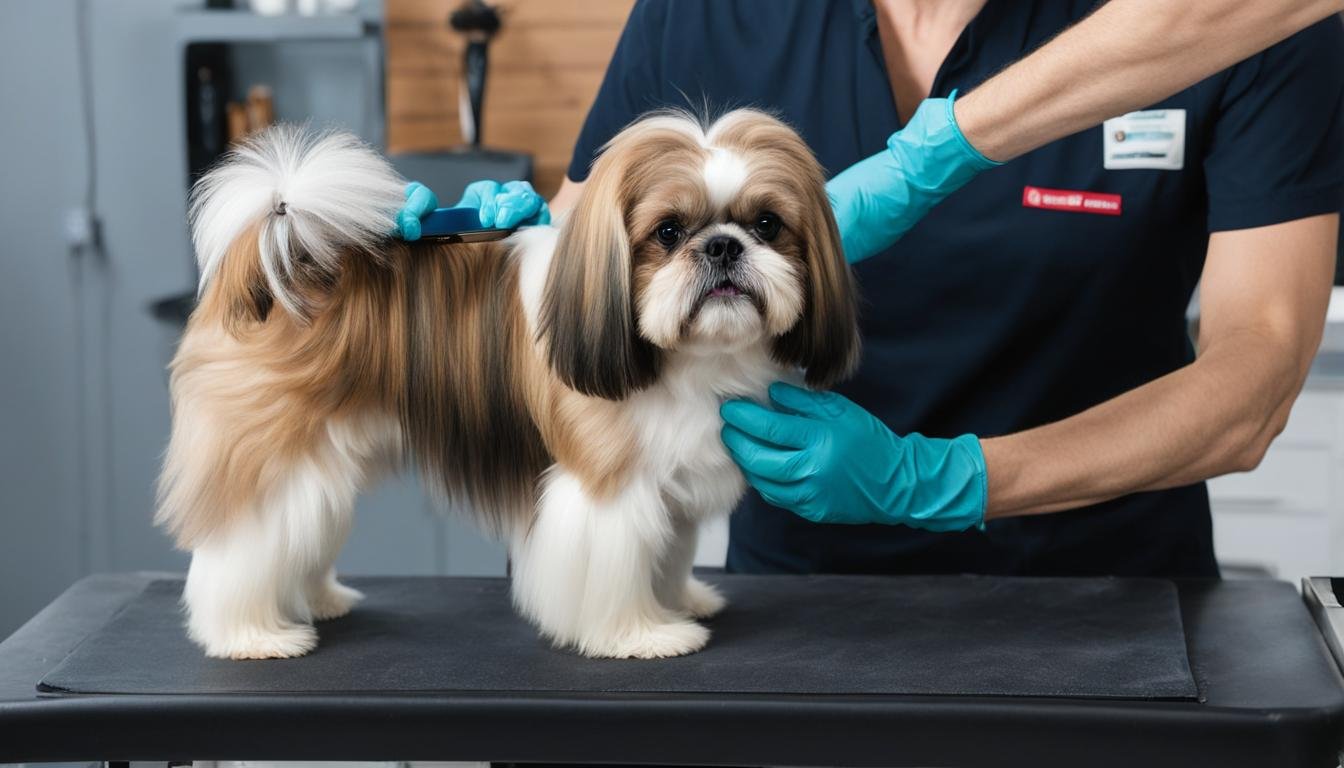Are you wondering why your beloved Shih Tzu’s hair is not as fluffy as you’d like it to be? Don’t worry, you’re not alone. Many Shih Tzu owners face this same concern, as the fluffiness of their hair can vary from dog to dog. But fear not, there are tips and tricks to help you maintain that fluffy Shih Tzu hair you desire!
The fluffiness of a Shih Tzu’s hair can be influenced by several factors, including genetics, poor nutrition, inadequate grooming, dry skin and coat, and hormonal imbalances. Some Shih Tzus naturally have fluffier hair, while others have a sleeker coat. However, with the right care and attention, you can improve the appearance and fluffiness of your Shih Tzu’s coat.
To start, let’s address the role of genetics in determining your Shih Tzu’s hair fluffiness. While you can’t change their genetic makeup, proper grooming techniques, such as regular brushing and trimming, can help improve the overall appearance of their coat. By removing loose hair, preventing tangles, and distributing natural oils, you can enhance the fluffiness even if it’s not naturally abundant.
Another factor to consider is the importance of a balanced diet. A poor diet lacking essential nutrients can contribute to a lackluster coat. Ensure you’re feeding your Shih Tzu a high-quality, well-balanced dog food that provides the necessary omega-3 fatty acids, protein, and vitamins. Consulting a veterinarian can help you determine the right diet for your dog’s specific needs.
Proper grooming practices are essential as well. Regular brushing with the right tools can help maintain a fluffy coat. Consider using a pin brush or slicker brush at least three times a week to remove loose hair and prevent tangles. It’s also important to trim the hair around the eyes, ears, and paws to maintain their fluffiness. By staying consistent with grooming, you can prevent a less fluffy appearance.
Dry skin and coat can also contribute to diminished fluffiness. It’s crucial to use moisturizing shampoos and conditioners specifically formulated for dogs to maintain the natural oils in their coat and prevent dryness. Additionally, hormonal imbalances, such as hypothyroidism or Cushing’s disease, can negatively impact a Shih Tzu’s coat. Seeking veterinary guidance and treatment can help address any underlying health issues affecting the fluffiness of their hair.
By implementing these tips and addressing the potential factors affecting your Shih Tzu’s hair fluffiness, you can enhance their coat’s appearance and maintain a fluffy and adorable look for your furry friend!
Genetics and Fluffiness
The fluffiness of a Shih Tzu’s hair can vary due to genetics. While some Shih Tzus naturally have fluffy hair, others may have a sleeker coat. The genetic makeup of a Shih Tzu plays a significant role in determining the texture and appearance of their hair. Unfortunately, it’s not possible to alter the genetic predisposition of a Shih Tzu to have a naturally fluffy coat.
However, there are grooming techniques that can help improve the appearance of a Shih Tzu’s coat, even if it’s not naturally fluffy. Regular brushing is a crucial part of maintaining a Shih Tzu’s hair. Brushing removes loose hair, prevents tangles, and distributes the natural oils that contribute to a healthy coat. The use of appropriate grooming tools, such as a pin brush or slicker brush, is essential for effective brushing.
In addition to brushing, regular trimming can help enhance the overall look of a Shih Tzu’s coat. Trimming the hair around the eyes, ears, and paws not only keeps these areas clean but also adds a neat and well-groomed appearance.
Regular Brushing and Trimming
Regular brushing and trimming are vital grooming techniques that can help improve the look of a Shih Tzu’s hair, regardless of its natural fluffiness. By incorporating these grooming practices into a regular routine, you can keep your Shih Tzu’s coat in optimal condition and maintain a neat and tidy appearance.
| Grooming Technique | Benefits |
|---|---|
| Regular Brushing | Removes loose hair, prevents tangles, and distributes natural oils |
| Trimming | Maintains cleanliness and adds a neat appearance |
By following proper grooming techniques, you can enhance the overall look of your Shih Tzu’s coat, whether it’s naturally fluffy or not.
Poor Nutrition and Fluffy Hair
A poor diet lacking essential nutrients can be a significant reason why Shih Tzu hair is not fluffy. Just like humans, dogs need a balanced and nutritious diet to maintain a healthy coat. Feeding your Shih Tzu a high-quality dog food that meets their nutritional needs is crucial for promoting a fluffy and shiny coat.
When it comes to Shih Tzu hair care, make sure their diet includes omega-3 fatty acids, which are known to improve the quality of the coat. Omega-3 fatty acids can be found in fish oil, salmon, and flaxseed oil. These essential fatty acids help keep the skin and hair moisturized, preventing dryness and brittleness.

Additionally, ensure that your Shih Tzu’s diet includes adequate protein, as it plays a crucial role in hair growth and strength. Good sources of protein for dogs include lean meats like chicken, turkey, and beef. Consult with your veterinarian to determine the ideal amount of protein your Shih Tzu needs based on their age, size, and activity level.
Vitamins and minerals are also essential for maintaining a fluffy coat. Biotin, vitamin E, and zinc are particularly beneficial for hair health. These nutrients can be found in various foods such as eggs, liver, leafy greens, and whole grains. However, it’s important to consult with a veterinarian before adding any supplements to your Shih Tzu’s diet to ensure they are safe and appropriate.
Tips for Shih Tzu Hair Care
- Choose a high-quality dog food that is specifically formulated for small breeds.
- Ensure the diet includes omega-3 fatty acids from sources like fish oil or flaxseed oil.
- Incorporate protein-rich foods such as lean meats into the diet.
- Include fruits and vegetables to provide essential vitamins and minerals.
- Consult with a veterinarian to determine the ideal diet for your Shih Tzu’s specific needs.
By providing your Shih Tzu with the proper nutrition, you can help improve the health and fluffiness of their coat. Remember, a well-balanced diet, along with regular grooming and proper care, is essential for maintaining a beautiful and fluffy coat in your beloved Shih Tzu.
Inadequate Grooming and Fluffiness
Regular grooming is essential for maintaining a fluffy coat in Shih Tzus. Brushing your Shih Tzu at least three times a week with the right tools, such as a pin brush or slicker brush, can help remove loose hair, prevent tangles, and distribute natural oils. Regular trimming of the hair, especially around the eyes, ears, and paws, is also important. Inadequate grooming can lead to a less fluffy appearance.
Grooming your Shih Tzu not only improves their physical appearance but also promotes their overall well-being. Regular brushing helps to remove loose hair, preventing it from matting and tangling. It also stimulates the skin, promoting healthy oil production and improving circulation.
When brushing your Shih Tzu, start from the head and work your way down to the tail, being gentle and careful especially around sensitive areas such as the face and ears. Use a pin brush or slicker brush with rounded tips to avoid scratching their skin. This will help to remove any tangles, knots, or mats, ensuring their coat remains fluffy and free from discomfort.
Trimming your Shih Tzu’s hair is also important in maintaining a fluffy appearance. Regular trimming of the hair around the eyes, ears, and paws not only prevents hair from obstructing their vision and causing discomfort but also gives their coat a neat and tidy look. You can visit a professional groomer or learn how to trim your Shih Tzu’s hair yourself if you feel confident.
In addition to regular brushing and trimming, it is essential to establish a grooming routine that includes bathing your Shih Tzu with a moisturizing shampoo and conditioner suitable for their coat type. This helps to keep their skin and coat hydrated, preventing dryness and promoting a fluffy look.
Shih Tzu Fluffy Hair Tips:
- Brush your Shih Tzu at least three times a week to remove loose hair and prevent tangles.
- Use a pin brush or slicker brush with rounded tips to avoid scratching their skin.
- Trim the hair around their eyes, ears, and paws regularly to maintain a neat and fluffy appearance.
- Establish a grooming routine that includes moisturizing shampoos and conditioners to keep their skin and coat hydrated.
| Shih Tzu Fluffy Hair Tips | Solutions for Flat Shih Tzu Hair |
|---|---|
| Regular brushing with the right tools | Use volumizing sprays or mousse to add volume |
| Trimming the hair around the eyes, ears, and paws | Apply a moisturizing conditioner to keep the coat hydrated |
| Establishing a grooming routine with moisturizing products | Use a quality dog shampoo and conditioner specifically for the Shih Tzu breed |
| Consult a professional groomer for expert advice |
Dry Skin and Hormonal Imbalances
Dry skin and coat can be one of the reasons why your Shih Tzu’s hair may not appear as fluffy as you’d like. Environmental conditions, such as low humidity or excessive indoor heating, can contribute to dryness. Additionally, allergies to certain substances or harsh shampoos can also cause dryness and make the coat less fluffy.
To maintain your Shih Tzu’s hair fluffiness, it is important to use moisturizing shampoos and conditioners specifically formulated for dogs. These products help to preserve the natural oils in the coat and prevent dryness. Be sure to carefully select gentle and nourishing grooming products to keep your Shih Tzu’s coat healthy and fluffy.
In some cases, hormonal imbalances can negatively affect the appearance and fluffiness of a Shih Tzu’s hair. Conditions such as hypothyroidism or Cushing’s disease can lead to changes in the coat texture. If you suspect a hormonal imbalance may be the cause of your Shih Tzu’s less fluffy hair, it is advisable to consult with a veterinarian. They can provide a proper diagnosis and recommend appropriate treatments to address the underlying hormonal issues, ultimately improving the fluffiness of your Shih Tzu’s coat.
